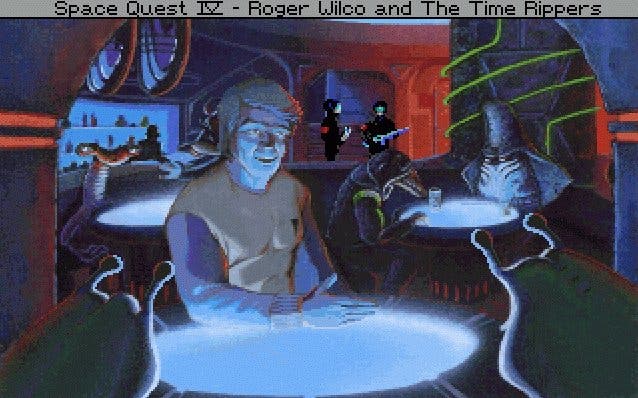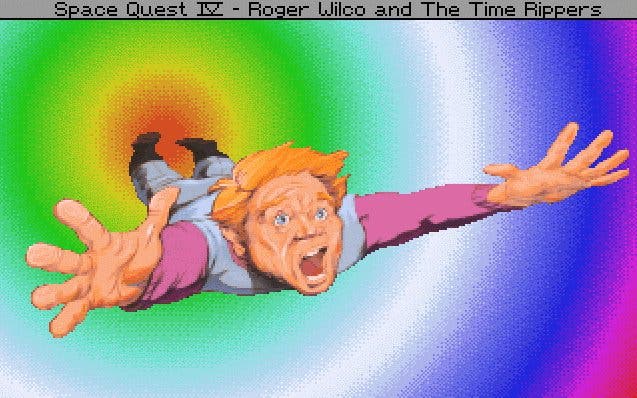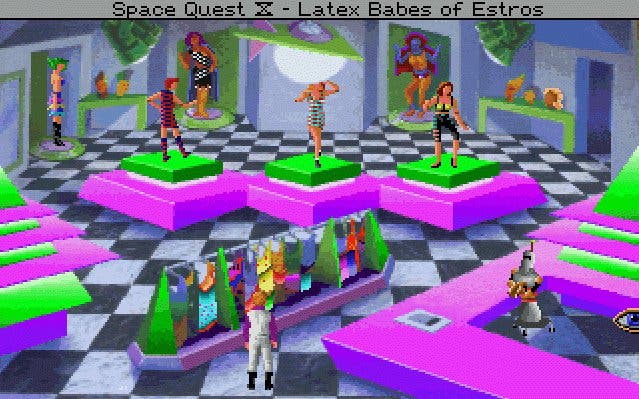Retrospective: Space Quest IV
Travel forward, back, back again, then forward, back a bit, then forward again in time.
There tend to be two angles taken on a retro piece. Either someone goes back to a game they love and explains why they love it, or they go back to a well-known game and point out how it was actually quite flawed. I intend to take a slightly different approach to this reflection on Space Quest IV: Roger Wilco and the Time Rippers. This is a piece about how it was actually quite flawed, and why I love it.
Adventure games are enjoying a moment of renewed interest of late - the timing is perfect. Handheld gaming devices find mass popularity at the same time as a vast "casual" gaming market is exposed. The gentle nature of the adventure is the ideal next step for those who've discovered they enjoy playing games via their iPhone or lunchtime forays into the lands of PopCap. And adventures are appropriately technically undemanding for the non-hardcore platforms, the DS, the Apple gadgets, and even the Wii. As LucasArts apparently goes through some sort of exorcism and discovers the sweet, good-natured child within, its adventures are appearing on Steam. Charles Cecil has remade the original Broken Sword for DS and Wii, and has just announced an updated Beneath A Steel Sky for the iPhone. And just recently Activision-Blizzard has added a few of the Sierra adventure collections onto Steam, et al.

The Space Quest games were one of Sierra's many ongoing adventure series, alongside King's Quest, Police Quest, Quest For Glory (sort of adventures), Leisure Suit Larry, and Gabriel Knight. Directly competing with LucasArts in a thriving genre, each publisher had taken a distinct approach, leapfrogging over each other with each generation. But as history looks back, LucasArts are undoubtedly declared the winners, with the Sierra games rarely given the same accolades and respect. It's tough to find anyone in the gaming industry who wasn't influenced or delighted by Day Of The Tentacle or Grim Fandango. It's much more tough to find someone who'd tell you it was Police Quest III that made them want to be a developer. (And they bloody well should, Police Quest III was fantastic.)
However, I think a lot of the reputation earned by rival developers comes from people miscrediting Sierra's themes. Because if someone can point me to the early nineties LucasArts adventure that contained the dozens of jokes in every scene they're constantly applauded for, I'll be very interested. That was Sierra, and it was most especially Space Quest IV.
The story behind the development of Space Quest IV is certainly more interesting than the story in the game. The tale of Roger Wilco, hapless space janitor, travelling through time to prevent something something, and rescue maybe his son or something, is clumsy at best. In fact, in a throbbingly bad bit of storytelling, you only find out any of the motivating reasons for doing anything you do in the closing cut-scene. However, SQ4 is about gags, lots and lots of gags, everywhere.

Things weren't so funny for those making it, if the bitter rantings of co-creator Scott Murphy accurately reflect the time. He and artist/musician Mark Crowe had created the series three episodes previously, known collectively as Two Guys From Andromeda, but by this point apparently weren't so fond of each other. But this was nothing compared to the animosity for their bosses at Sierra (expressed by Murphy, at least).
SQ4 was originally intended to use the parser interface that all Sierra games had until this point. This was a text box that appeared on screen, into which you typed instructions. So you might walk Leisure Suit Larry toward the bar with the mouse cursor, but you would type, "Ask man for drink" into the box. It was a vestige of their progenitor, the text adventure, that allowed the player to be infinitely inventive in their input, to discover the boundaries of the finite inventiveness of the creators. Or perhaps it let you type in, "s*** in the flower pot" to see if the developers had written a funny response for that. But this vestige was to become vestigial. LucasArts had the SCUMM engine, which let you build the sentences from pre-defined verbs and inventory icons, and Sierra was making the leap to cursor-only, with a number of different icons chosen by right-clicking (or using the menu at the top). A leap the Andromeda Guys weren't ready to make, but had imposed upon them.
This explains a great deal about the resulting game. Space Quest III: The Pirates Of Pestulon had been about as self-indulgent as a game could be, the creators writing themselves into the story, with series antihero Roger Wilco rescuing them and eventually getting them jobs at Sierra. The fourth episode took the meta in another direction, with a literalisation of its being a series, Wilco able to time travel between the editions. Beginning in Space Quest IV, sat in a bar regaling aliens with exaggerated versions of his previous adventures (preceded by the cutest animation of a little creature dissolving in a puddle of his own vomit), he's attacked by the Sequel Police, rescued by a mysterious stranger, and sent through a rip in time into Space Quest XII: Vohaul's Revenge.

It's an awesome concept, clearly. Soon you're into Space Quest X: Latex Babes Of Estros (a spoof of the Leather Goddesses of Phobos game), and later into Space Quest I: The Sarien Encounter. (And there's access to Space Quest III if you want to find another more interesting way to die). This works in a large part thanks to one of Sierra's recurring themes - the title appearing throughout the game at the top of the screen, sometimes accompanied by your score (another element long lost to the adventure). So when you arrive in XII, that's the name at the top, which in its day was quite peculiarly subverting.
The best and worst of the game becomes immediately apparent. As you wander the ruins of Xenon, exploring the opening scenes, there's a wealth of ridiculous jokes. If you can stay alive long enough to find them.

